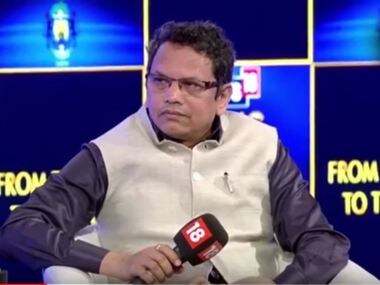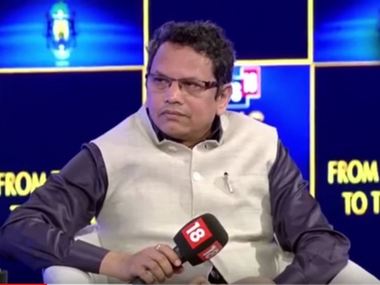An interesting idea emerged at the recent News18 Rising India Summit during a panel discussion on ‘India’s Place in the World: Opportunities and Challenges’. The panelist, BJP’s foreign policy cell chief Vijay Chauthaiwale, posited that India may well explore the possibility of an economic integration with South Asia minus Pakistan. Prima facie, the concept looks appealing. If we can create a regional architecture beyond Pakistan, interlink trade, better integrate smaller economies with India’s large market and promote regional connectivity, several problems could be addressed at once. On the economic front, it would close to a certain degree the gap between potential and reality in trade ties with our neigbours. [caption id=“attachment_4399771” align=“alignleft” width=“380”]  Vijay Chauthaiwale at News18 Rising India Summit. News18[/caption] India’s trade with the ASEAN bloc, for instance, stood at $71.6 billion in 2016-17. It marked a 10 percent rise from $65.1 billion in 2015-16. If that sounds good, consider that “two-way trade between China and ASEAN stood at $452.31 billion in 2016 while its exports to Asean totalled $256 billion,” reported The Times of India quoting industry data. There is space for exponential growth which India has been unable to tap so far. On the strategic front, by better leveraging regional and sub-regional mechanisms such as BBIN (Bangladesh, Bhutan, India, Nepal) and BIMSTEC (Bay of Bengal Initiative for Multi-Sectoral Technical and Economic Cooperation) — that draw upon India’s traditional advantages in the region — New Delhi may be able to restrict Beijing’s influence and restore India’s primacy in the subcontinent that is right now under severe challenge. Equally crucially, such a strategic step would limit Pakistan’s ability to cause regional disruption and would isolate Islamabad further. However, when it comes to Pakistan, pressing the ‘hard reset’ button is easier said than done. Though bilateral relationship is in a state of permanent disrepair with hostility on the border now spilling over into the diplomatic domain, any step to isolate Pakistan from the region is likely to be met with many hurdles, including a severe internal resistance. There are also other issues involved. Though the current government is trying to move on multiple fronts — greater connectivity, increased economic and cultural integration and sustained diplomacy with regional partners — India cannot hope to match China’s chequebook diplomacy nor can it wish away its capacity constraints and sluggish delivery mechanism when it comes to big-ticket projects. India has signed multiple agreements with Mynmar on building a host of infrastructure projects in the East Asian state including upgradation of ports and bridges; a 160-kilometre-long India-Myanmar Friendship Road; a 1400-kilometre-long India-Myanmar-Thailand (IMT) highway linking Manipur to Mae Sot in Thailand via Myanmar (Delhi now plans to also bring Cambodia, Laos and Vietnam within its ambit) but most of these projects have fallen prey to delays. The IMT highway, for instance, was scheduled to be completed by 2015. The deadline has now been extended by five years.
Myanmar is strategically important for India because it provides the landlocked and development-hungry northeast with a gateway to ASEAN markets and a maritime opening but India’s ambitious regional game has frequently been thwarted due to its inability to follow up on agreements and implement projects. This is an area where China hurts us the most.
As Sudha Ramachandran writes in The Diplomat, “Like India, China is engaged in upgrading ports, extracting oil, and building roads and bridges in Myanmar. Indeed the two Asian giants often compete for infrastructure projects here… However, India’s investment in Myanmar is a fraction of that of China. India invested just over $224 million in Myanmar during fiscal year 2015-2016, and no new investments were made in the first four months of fiscal 2016-17. In comparison, China invested $3.3 billion in Myanmar in 2015-16… Lack of coordination among different implementing agencies, poor monitoring, and financial constraints are among the main reasons for India’s failure to meet deadlines…”
India’s own connectivity and infrastructure needs, and a political system that is too focused on itself to care about what’s going on the neighbourhood are other impediments in the strategy.
Yet Chauthaiwale’s arguments at the News18 Summit merit some consideration. Responding to a question on whether South Asian nations can emulate the European trade bloc, he said: “I don’t think we can delink terrorism from the rest of our relationship with Pakistan. But can we think of a South Asia minus Pakistan and bring other countries on the table.”
A revision of our Pakistan policy is possible only when India is ready to accept that “normalization” of bilateral ties through dialogue isn’t a feasible option, and therefore we must look beyond a policy that has proven to be a failure despite an extended run spanning several decades.
Bilateral tie has and continues to remain suspended between two episodic realities of open hostility and peace overtures with one inevitably following the other. To break free from this vicious cycle we need fresh thinking, and only then can we begin to formulate a new policy that takes into consideration the fact that apart from shared history, there is very little substance that define us. As former RAW chief Vikram Sood writes: “There is very little content in India-Pakistan relations. There was never much of it anyway. It is much less now. There is barely any trade and no tourism. Pakistan will not implement the Afghan Transit Treaty; has dragged its feet on granting MFN with 1209 items on the negative list. Exports to India are terror and more terror. That being so, there is little point in maintaining such large missions there, and if our policy is to ignore Pakistan until they learn to behave like a responsible neighbour we should have downgraded our embassy representation a long time ago.” Therefore, a regional architecture that builds mutual cooperation avoiding the toxicity that Pakistan brings to the table could be a good start. But India first needs to sort out its “neighbourhood policy”. If ideas aren’t followed up with implementation, then regionalism will remain a pipe dream.


)

)
)
)
)
)
)
)
)



